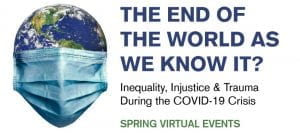Psychology faculty members Drs. Jonathan Raskin and Karla Vermeulen were featured speakers in a “Without Limits” panel sponsored by the College of Liberal Arts and Sciences. The panel was held virtually. Watch the YouTube video below.
—
 COVID-19: Trauma & Coping Faculty Panel
COVID-19: Trauma & Coping Faculty Panel
Tuesday, March 2 at 5 PM
WebEx Link
Moderated by Isidoro Janeiro (Languages, Literatures, and Cultures)
“Trauma and ‘The Hunger Winter’: Lessons for the 21st Century” – Kristopher Jansma (Creative Writing)
Early in the pandemic, I began a series of weekly check-in phone calls with my grandmother, Oma, and I brought up my concerns about the impact that the pandemic would have on my young children. Oma began to relate stories of a similar period in her own childhood during the Nazi occupation of Holland at the end of WWII, known as “The Hunger Winter” because of the starvation caused when resources were cut-off from the Dutch people after a coordinated resistance. I’ll describe some of the ways in which fear and violence caused trauma that had lasting impacts on my grandmother’s physical and psychological health, and what that may tell us about the impact that the current pandemic may have on this generation of children. I’ll also discuss how narrative storytelling may give us ideas for ways to mitigate that impact over the long term.
“The Coronavirus in Context: A Guide for Coping” – Jonathan D. Raskin (Psychology)
I will discuss how understanding the role of contexts can help people cope with the coronavirus pandemic. Contexts are sets of presuppositions that shape a person’s experiences. Two very common contexts, mind and self, can inform our understanding of how people have responded to the coronavirus pandemic. The mind consists of a person’s defensive and protective postures in the face of perceived threat, whereas the self takes a broader perspective and emphasizes human connections and interrelatedness. Awareness of several mind/self contrasts—blame versus responsibility, insufficiency versus sufficiency, being at effect versus being at cause, and avoidance versus mastery—can help improve coping in face of the coronavirus pandemic.
“Welcome to Adulthood!: Coming of Age During a Pandemic” – Karla Vermeulen (Psychology, Institute for Disaster Mental Health)
While the pandemic has impacted everyone globally, the particular form that impact takes is specific to individual characteristics – including developmental stage. Clearly there’s no good time of life to be locked down: Young kids are suffering from the delay of typical milestones and interactions that usually characterize childhood, while older adults may fear they don’t have enough time left to try to make up for missed experiences. What about emerging adults (ages 18 to 29), including most of our students? Building on past quantitative and qualitative research, I will explore how the pandemic has added yet another layer of stress, anxiety, disappointment, and trauma for a generation that was already dealing with the threat of school shootings and other disasters, climate change, racial injustice, socioeconomic inequities, and student loan debt. Yet they’re fighting to continue their education and to take on adult responsibilities, demonstrating a collective level of resilience we should all respect.
—
Kristopher Jansma is the author of Why We Came to the City and The Unchangeable Spots of Leopards, winner of the Sherwood Anderson Foundation Fiction Award, a Pushcart Prize, and the recipient of an honorable mention for the PEN/Hemingway Award. He has written for the New York Times, Chicago Quarterly Review, ZYZZVA, The Believer, Prairie Schooner, and Electric Literature. His work has been noted as distinguished in The Best American Short Stories 2016 and The Best American Essays 2014. He is an Associate Professor of English and the Director of Creative Writing at SUNY New Paltz. He lives in Westchester with his wife and two children.
Jonathan D. Raskin is a professor of psychology and counselor education at the State University of New York at New Paltz. He currently serves as chair of the Department of Psychology, which houses the psychology undergraduate program and graduate programs in counselor education and psychological science. In addition to his faculty work, Dr. Raskin is co-editor of the Journal of Constructivist Psychology. He is also a licensed psychologist who maintains an active private practice. Dr. Raskin’s research focuses on constructive meaning-based approaches in psychology and counselor education, especially their applications to understanding abnormality, counseling, and psychotherapy. Much of his scholarship builds on George Kelly’s personal construct theory and Ernst von Glasersfeld’s radical constructivism, but he also incorporates social constructionism, narrative therapy, solution-focused therapy, context-centered therapy, and other constructivist approaches. Dr. Raskin is the author of the textbook Abnormal Psychology: Contrasting Perspectives.
Karla Vermeulen is an Associate Professor of Psychology, and the Deputy Director of the Institute for Disaster Mental Health. She also oversees the Student Psychological Resilience Project, a new campus initiative which aims to destigmatize stigma around mental health issues and encourage well-being among students. Her research focuses on the impact of growing up in the post-9/11, disaster-filled world for today’s emerging adults. That will be the subject of her third book, Generation Disaster: Coming of Age Post-9/11, which will be published in 2021 as part of the Oxford University Press Emerging Adulthood series.
